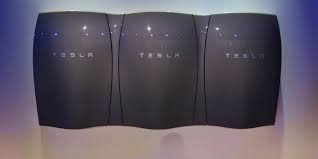
If the dream of Elon Musk of millions of households producing all their own power becomes a reality, it will probably happen first in Germany.
But there would be a battle for Musk for market share from the local firms with years of experience in renewable energy.
Global interest in Musk’s idea was raised in April this year when his company Tesla said it would start selling lithium-ion batteries for households next year. Tesla, the company owned by this South African-born entrepreneur, is better known for its electric cars.
Raising the prospect that households one day will be able to rely fully on clean energy and become independent of the power grid, the batteries, called Powerwalls, connect to solar panels on the roof of a house and aim to store enough power during the day to drive kettles and washing machines at night.
There are big challenges.
While the German solar industry association BSW estimates batteries currently raise solar power self-sufficiency to at least 60 percent, the technology does not yet allow most users to disconnect from the grid.
It is also costly - buying and installing solar panels and batteries costs around 10,000 euros ($10,600) or more.
Germany - with more solar panels than anywhere in the world and sky-high power prices - could become the industry's first mass-market as the technology is improving, and costs are falling.
"The business model of power batteries is becoming increasingly attractive," said Norbert Schwieters, global utilities leader at consultants PwC. Schwieters noted that the market estimates that sales in Germany could reach half a million within a decade, up from around 25,000 now.
Musk will have a fight on his hands against German companies with established retail networks and years of experience managing solar equipment, if the market does take off.
Some of the German rivals of Musk think he has created a buzz around home power storage batteries that will ultimately work in their favor while acknowledging Musk's slick marketing - Powerwalls are made at his "Gigafactory" in the Nevada Desert.
"Tesla has made sure that they're seen as a lifestyle gadget," said Volker Wachenfeld, in charge of hybrid energy and storage solutions at SMA Solar.
Some of the competitors for Musk are SMA Solar, Sonnenbatterie, SENEC.IES and Varta. A new product is to be launched by Daimler Accumotive while Solarwatt, owned by major BMW shareholder Stefan Quandt, says it is ready to join the fray.
Sonnenbatterie, has already sold around 8,500 batteries in Europe, mostly in Germany . the company is backed by Germany's E-Capital and Czech firm Inven Capital among others.
"The biggest challenge of our generation is the move to renewable and inexpensive energy supply," said its 32-year-old managing director, Philipp Schroeder.
"I started this vision and now want to take it to global success," Schroeder said.
With partnerships with German companies Beegy and LichtBlick, aimed to benefit from local expertise, Tesla, which has made Germany one of its three launch markets for Powerwalls, is ready for a fight.
(Surce:www.streetinsider.com)
But there would be a battle for Musk for market share from the local firms with years of experience in renewable energy.
Global interest in Musk’s idea was raised in April this year when his company Tesla said it would start selling lithium-ion batteries for households next year. Tesla, the company owned by this South African-born entrepreneur, is better known for its electric cars.
Raising the prospect that households one day will be able to rely fully on clean energy and become independent of the power grid, the batteries, called Powerwalls, connect to solar panels on the roof of a house and aim to store enough power during the day to drive kettles and washing machines at night.
There are big challenges.
While the German solar industry association BSW estimates batteries currently raise solar power self-sufficiency to at least 60 percent, the technology does not yet allow most users to disconnect from the grid.
It is also costly - buying and installing solar panels and batteries costs around 10,000 euros ($10,600) or more.
Germany - with more solar panels than anywhere in the world and sky-high power prices - could become the industry's first mass-market as the technology is improving, and costs are falling.
"The business model of power batteries is becoming increasingly attractive," said Norbert Schwieters, global utilities leader at consultants PwC. Schwieters noted that the market estimates that sales in Germany could reach half a million within a decade, up from around 25,000 now.
Musk will have a fight on his hands against German companies with established retail networks and years of experience managing solar equipment, if the market does take off.
Some of the German rivals of Musk think he has created a buzz around home power storage batteries that will ultimately work in their favor while acknowledging Musk's slick marketing - Powerwalls are made at his "Gigafactory" in the Nevada Desert.
"Tesla has made sure that they're seen as a lifestyle gadget," said Volker Wachenfeld, in charge of hybrid energy and storage solutions at SMA Solar.
Some of the competitors for Musk are SMA Solar, Sonnenbatterie, SENEC.IES and Varta. A new product is to be launched by Daimler Accumotive while Solarwatt, owned by major BMW shareholder Stefan Quandt, says it is ready to join the fray.
Sonnenbatterie, has already sold around 8,500 batteries in Europe, mostly in Germany . the company is backed by Germany's E-Capital and Czech firm Inven Capital among others.
"The biggest challenge of our generation is the move to renewable and inexpensive energy supply," said its 32-year-old managing director, Philipp Schroeder.
"I started this vision and now want to take it to global success," Schroeder said.
With partnerships with German companies Beegy and LichtBlick, aimed to benefit from local expertise, Tesla, which has made Germany one of its three launch markets for Powerwalls, is ready for a fight.
(Surce:www.streetinsider.com)





